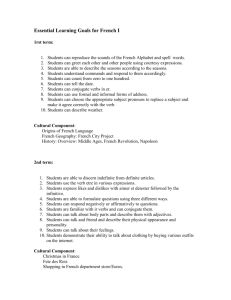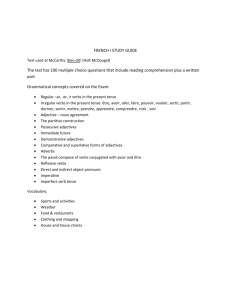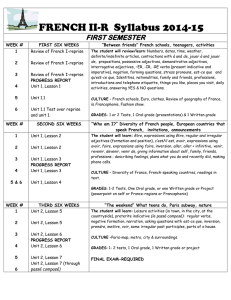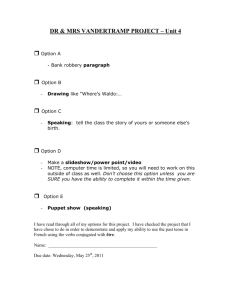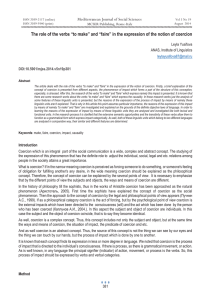Syllabus
advertisement
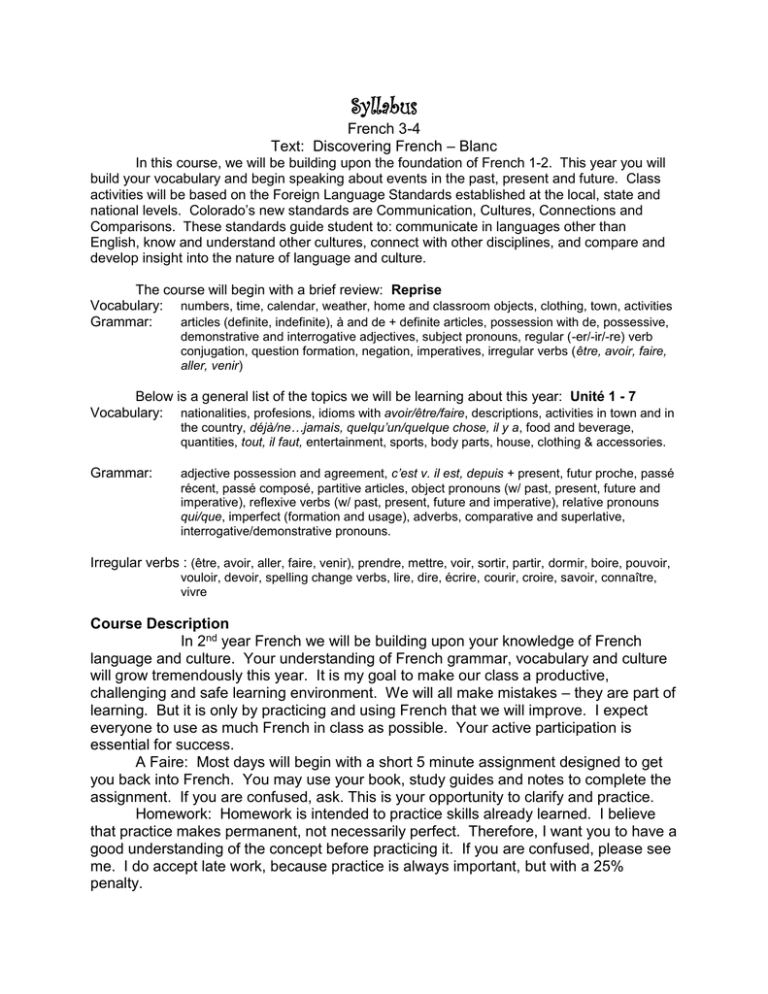
Syllabus French 3-4 Text: Discovering French – Blanc In this course, we will be building upon the foundation of French 1-2. This year you will build your vocabulary and begin speaking about events in the past, present and future. Class activities will be based on the Foreign Language Standards established at the local, state and national levels. Colorado’s new standards are Communication, Cultures, Connections and Comparisons. These standards guide student to: communicate in languages other than English, know and understand other cultures, connect with other disciplines, and compare and develop insight into the nature of language and culture. The course will begin with a brief review: Reprise Vocabulary: numbers, time, calendar, weather, home and classroom objects, clothing, town, activities Grammar: articles (definite, indefinite), à and de + definite articles, possession with de, possessive, demonstrative and interrogative adjectives, subject pronouns, regular (-er/-ir/-re) verb conjugation, question formation, negation, imperatives, irregular verbs (être, avoir, faire, aller, venir) Below is a general list of the topics we will be learning about this year: Unité 1 - 7 Vocabulary: nationalities, profesions, idioms with avoir/être/faire, descriptions, activities in town and in the country, déjà/ne…jamais, quelqu’un/quelque chose, il y a, food and beverage, quantities, tout, il faut, entertainment, sports, body parts, house, clothing & accessories. Grammar: adjective possession and agreement, c’est v. il est, depuis + present, futur proche, passé récent, passé composé, partitive articles, object pronouns (w/ past, present, future and imperative), reflexive verbs (w/ past, present, future and imperative), relative pronouns qui/que, imperfect (formation and usage), adverbs, comparative and superlative, interrogative/demonstrative pronouns. Irregular verbs : (être, avoir, aller, faire, venir), prendre, mettre, voir, sortir, partir, dormir, boire, pouvoir, vouloir, devoir, spelling change verbs, lire, dire, écrire, courir, croire, savoir, connaître, vivre Course Description In 2nd year French we will be building upon your knowledge of French language and culture. Your understanding of French grammar, vocabulary and culture will grow tremendously this year. It is my goal to make our class a productive, challenging and safe learning environment. We will all make mistakes – they are part of learning. But it is only by practicing and using French that we will improve. I expect everyone to use as much French in class as possible. Your active participation is essential for success. A Faire: Most days will begin with a short 5 minute assignment designed to get you back into French. You may use your book, study guides and notes to complete the assignment. If you are confused, ask. This is your opportunity to clarify and practice. Homework: Homework is intended to practice skills already learned. I believe that practice makes permanent, not necessarily perfect. Therefore, I want you to have a good understanding of the concept before practicing it. If you are confused, please see me. I do accept late work, because practice is always important, but with a 25% penalty. Verbathon: Each week you will be given verbs to learn for the following week when you will be expected to conjugate them. We will practice the verbathon during the week so you will know exactly what to expect. 10 points are possible each week for a perfect score. 1-3 small errors – write the correction 50 times for a score of 8 or 9. More than 3 mistakes - you much retake the verbathon for a maximum score of 8. You may retake the verbathon as many times as necessary to get it right. Your grade will remain 0 until you pass. Tests and Quizzes: At the end of each lesson there will be a quiz and at the end of each unit (4 lessons) there will be a test. You will be given a study guide as we begin each unit. Generally quizzes are worth 30-50 points and tests 100-150 points. The format and knowledge needed for a test or quiz will never be a surprise. Assessment Assessment of learning will take place on a continuous, daily basis. Your mastery of French will be assessed in a wide variety of ways: daily classroom activities, homework, quizzes, unit tests, oral tests, projects, a mid-term written exam, a final project as well as District 11 assessments. If you are confused, read through the section in the book, look online for an explanation, ask classmates to explain and please see me. I use a traditional grading scale: 90% = A (superior work, easily comprehensible, very few errors, demonstrates mastery of concept), 80% = B (above average work, comprehensible, some errors, close to mastering the concept), 70% = C (average work, often comprehensible, errors show that more work is needed to master the concept) 60% = D (below average or incomplete work, sometimes comprehensible, errors show that the concept is not understood) 50% = F (too little work to evaluate or errors prohibit comprehension, no understanding of the concept); 0 = assignment not done. This scale will be used to evaluate daily classroom activities, homework, quizzes, unit tests, oral tests and activities, and projects. Extra Credit Extra credit points will be available through a wide variety of activities. At the beginning of each semester you will be given a colored sheet of paper to keep track of your extra credit points. Do not lose this paper; it is your responsibility; you will be given only one. Each stamp recorded on your paper will be worth one point on your grade. Stamps are given for perfect attendance, winning class games, written assignments such as puzzles, attending special events, watching French films or television programs etc.... Stamps may be earned by studying at certain, pre-approved websites such as Classzone.com or freerice.com (1000 grains=1stamp). The paper will be collected at the end of each semester and the points will be added onto your grade. No paper, no extra points. Attendance / Late Work / Missing Assignments Attendance is the key to success. Make every effort possible to be on-time and in class every day. If you are absent, check the website and check with classmates. You will be responsible for all work missed during your absence – with the possible exception of the A Faire. You will have 2 weeks to make up missing work. Tests and quizzes can be taken before or after school or during lunch. Please check with me to schedule a time.
